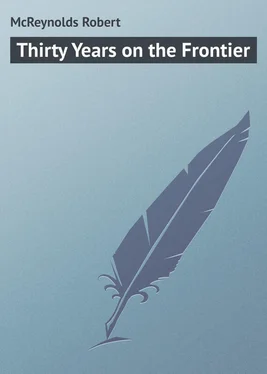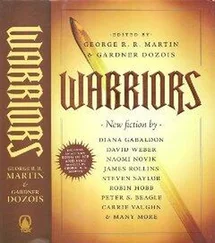Robert McReynolds - Thirty Years on the Frontier
Здесь есть возможность читать онлайн «Robert McReynolds - Thirty Years on the Frontier» — ознакомительный отрывок электронной книги совершенно бесплатно, а после прочтения отрывка купить полную версию. В некоторых случаях можно слушать аудио, скачать через торрент в формате fb2 и присутствует краткое содержание. Жанр: foreign_prose, на английском языке. Описание произведения, (предисловие) а так же отзывы посетителей доступны на портале библиотеки ЛибКат.
- Название:Thirty Years on the Frontier
- Автор:
- Жанр:
- Год:неизвестен
- ISBN:нет данных
- Рейтинг книги:4 / 5. Голосов: 1
-
Избранное:Добавить в избранное
- Отзывы:
-
Ваша оценка:
- 80
- 1
- 2
- 3
- 4
- 5
Thirty Years on the Frontier: краткое содержание, описание и аннотация
Предлагаем к чтению аннотацию, описание, краткое содержание или предисловие (зависит от того, что написал сам автор книги «Thirty Years on the Frontier»). Если вы не нашли необходимую информацию о книге — напишите в комментариях, мы постараемся отыскать её.
Thirty Years on the Frontier — читать онлайн ознакомительный отрывок
Ниже представлен текст книги, разбитый по страницам. Система сохранения места последней прочитанной страницы, позволяет с удобством читать онлайн бесплатно книгу «Thirty Years on the Frontier», без необходимости каждый раз заново искать на чём Вы остановились. Поставьте закладку, и сможете в любой момент перейти на страницу, на которой закончили чтение.
Интервал:
Закладка:
They had heard heavy firing on the afternoon of the 25th and saw the black cloud of smoke settle like a pall over the valley, but Reno had his wounded to care for, and to have gone to the relief of Custer would have left them to be butchered. Neither could he divide his command, for such a course would have been suicidal.
Meanwhile the supply steamer, Far West, with General Terry on board, steamed up the Yellowstone on June 23rd and overtook Gibbon’s troops near the mouth of the Big Horn on the morning of the 24th. At 5 o’clock on the morning of the 25th, Gibbon’s column was marching over a country so rugged as to tax the endurance of the men to the utmost, and the infantry halted for the night, meantime General Terry pushed ahead with the cavalry and a light mountain battery. On the morning of the 26th, some Crow Indians reported to General Terry that a great fight had been going on the day before, and later scouts reported that a dense, heavy smoke was resting over the southern horizon far ahead, and in a short time it became visible to all.
So broken was the country and progress became so difficult that it was not until the morning of the 27th that Terry’s relief column found the trail of Custer.
They had passed cautiously through a dense grove of trees and the head of the column entered upon a beautiful level meadow about a mile in width extending along the west side of the stream and skirted east and west by high bluffs. It was apparent at sight that this meadow had been the site of an immense Indian village and showed signs of hasty abandonment. Hundreds of lodge poles with finely dressed buffalo robes, dried meats, utensils and Indian trinkets were left behind. In a large tepee still standing were the stiffened forms of ten dead Indians. Every step of the march from here on showed signs of a desperate struggle. The dead bodies of Indian horses were seen; here and there were cavalry equipments, and soon the bodies of dead troopers, beside their frantic and still struggling, wounded horses gave evidence of a disastrous battle, and farther on was revealed a scene calculated to appall the stoutest heart. Here was a skirmish line marked by rows of slain with heaps of empty cartridge shells before them, and their officers lay dead just behind them. Still farther on men lay in winrows, their faces still drawn with the awful desperation of a struggle unto death; pulseless hands still clasped blood-stained sabres. Near the highest point of the hill lay the body of General Custer. There was a cordon of his brave defenders dead about him; his long hair was clotted with blood, while a great wound in his breast told how the brave soul had gone somewhere out into the wide waste and hush of eternity. Near him lay the body of his brother, Captain Custer, and some distance away another brother, Boston Custer, and his nephew, Armstrong Reed, a youth of 19. All were scalped except General Custer and Mark Kellogg, a correspondent of the New York Herald.
When the fight was at the hardest a Crow Indian with Custer wrapped himself in a dead Sioux Indian’s blanket and made his escape; as he left the field he saw the squaws and Indian children rifling the dead of their trinkets and going about with their stone battle axes beating out the brains of the wounded; they danced about over the dead and dying, mutilating their bodies and singing the wild, weird strains of their battle songs.
When the welcome news of relief came to Reno’s besieged command, strong men wept like children.
Among the first of his men to search among the fallen for a dead friend was one Charles Wilson, a blue-eyed, beardless trooper, a mere boy whose heart seemed to fairly break as he contemplated what must have been the awful death of his comrades. The man he was seeking was Jim Bristow, a tall, dark private whose last words to the young trooper were:
“Charley, my hour has come. We shall ride into this fight and you will come back alone. I want you to promise to take a little trouble for me when I am gone. You will find her face here in this locket upon my breast. I had thought to some day make her my wife, and that thought has gladdened my lonely life. Write to her, Charley, and tell her where is my resting place and that my spirit will wait for hers in that borderland twixt heaven and earth.”
The boy answered, and his voice was low with pain. Just then the bugle sounded, and for an instant eye met eye and hand touched hand, and Jim Bristow rode away with Custer’s column. This was the man young Wilson was searching for. The dead were so frightfully mutilated, their bodies bloated, blackened and swollen by the hot rays of the sun that they were buried as speedily as possible, on June 28th. Major Reno and the survivors of his regiment performed the last sad rites over their comrades and then a general retreat to the mouth of the Big Horn River was ordered.
V
THE SHADOW SCOUT
The bugle notes had died away, the cloud of battle smoke lifted from the valley and peaceful starlight shone over the rugged hills when a shadow crept out of a deep ravine and skulked into the valley of death and began dealing out retribution. Chief Dull Knife had much to say about it when he surrendered. He spoke in whispers when he referred to it, and he looked suddenly around, as if he feared it was softly stealing upon him to stab him in the back. Chief Gall’s braves had something to say about it when they surrendered, and when white men asked them who or what the shadow was, they shook their heads and whispered:
“We kill ’em all, but yet there is one left. It is a white man; there is blood on his face and clothing; he carries a sabre and two revolvers, and the night wind blows his long black hair over his shoulders. It is a spirit sent by the Great Manitou to watch over the graves of the white soldiers.”
White men saw the shadow, hunters, trappers and scouts who built their camp fires near that valley, through which the big mountain wolf skulked and prowled all night long, had felt the mysterious presence of the shadow or had seen it. They fled from their blankets at its soft step, and they had fired at it, and seen it glide off unharmed.
It was not a shadow of sentiment, but a being who sought vengeance for the butchery of the little band of heroes, for the brave comrades who grouped themselves about the noble Custer and fought to the death.
When the soldiers moved out of the valley, leaving so many graves behind them, the wolves rushed out from canon, ravine and den, to dig up the fresh earth and mutilate the dead. The shadow was there – a solitary, mysterious and vigilant sentinel to guard those sacred mounds. It screamed and gestured at the fierce beasts, it fired upon them with rifle and revolver and struck them with bright, keen sabre. The wolves ran here and there, from grave to grave, gnashing their teeth in anger, but the shadow closely pursued them. They formed in groups in the midnight darkness and waited for the shadow to tire out and fall asleep or go away, but it paced up and down over the graves, vigilant and unwearied, and daylight came to hurry the wild beasts to their lairs till another night.
Hunters and scouts had seen the sentinel-beat among the graves in the light of noon-day, when men could not be mistaken. The path ran from grave to grave, winding about to take in every one, and then it ran to the river and disappeared in a ledge of rocks. Scouts said it was a path beaten by human feet. The Indians said that a shadow or spirit alone could remain in that lonely spot, having only the company of wild beasts and the graves of the lonely dead.
Once when Red Cloud and a trusty few were scouting to learn the whereabouts of their white foes, they encamped in the valley for the night. The shadow stole among them as they slept, and when the fierce scream aroused the band from their slumbers, five of the red men had been murdered, each throat slashed across with a keen blade. The shadow stood and jeered at the living, who huddled together like frightened children. When they fled for their lives it pursued them with drawn saber, and one of them had a scar on his shoulder to prove he had been struck with a blade. Next day when a full band of Indians rode into the valley to solve the mystery and secure revenge, they saw no living thing. The bodies of the dead warriors were cut and hacked and gashed. Five of the poor cavalrymen whose brains had been beaten out had been revenged.
Читать дальшеИнтервал:
Закладка:
Похожие книги на «Thirty Years on the Frontier»
Представляем Вашему вниманию похожие книги на «Thirty Years on the Frontier» списком для выбора. Мы отобрали схожую по названию и смыслу литературу в надежде предоставить читателям больше вариантов отыскать новые, интересные, ещё непрочитанные произведения.
Обсуждение, отзывы о книге «Thirty Years on the Frontier» и просто собственные мнения читателей. Оставьте ваши комментарии, напишите, что Вы думаете о произведении, его смысле или главных героях. Укажите что конкретно понравилось, а что нет, и почему Вы так считаете.












